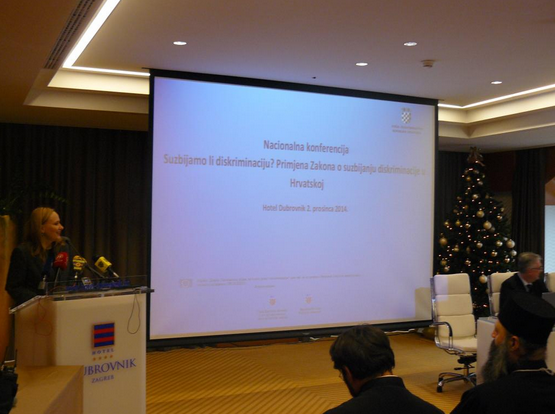National conference on Anti-Discrimination Act ´´Are we combating discrimination? Application of Anti-Discrimination Act´´ was held on Tuesday, December 2nd 2014, at Hotel Dubrovnik in Zagreb. The conference was organized by the Office of the Ombudsman within a project called „Development of the National Plan to Combat Discrimination“, done in partnership with the Government Office for Human Rights and Rights of National Minorities.
The conference
was held with the purpose of considering and analyzing the application of Anti-Discrimination Act during the past period and it gathered experts in the field of combating discrimination: judges, lawyers, r
The conference took place in four thematic sessions which succeeded welcoming speeches by the Ombudswoman, Ms. Lora Vidović, the Head of Government Office for Human Rights and Rights of National Minorities, Mr. Branko Sočanac, Deputy Minister of Justice, Ms. Sandra Artuković Kunšt and the President of the Supreme Court, Mr. Branko Hrvatin. The cover topics were addressed by experts, representatives of institutions deeply involved in the implementation of the Act, i.e. agents who, along with the direct application of the Act, are dealing with anti-discrimination by raising public awareness about discrimination as legally forbidden conduct and by activism.epresentatives of independent and government bodies, civil society organizations and academia.
I. session entitled “Application of the Anti-Discrimination Act at Courts” was moderated by Ms. Ivana Radačić, senior scientist at Social Sciences Institute Ivo Pilar. Ms. Gordana Klarić, Assistant Minister of Justice, spoke about the record keeping and presented statistical data on discrimination cases at courts in the Republic of Croatia. The Judge of the High Misdemeanor Court, Ms. Branka Žigante Živković, presented experiences in conducting discriminatory misdemeanor proceedings.
Mr. Domagoj Franjo Frntić, the President of the Municipal Labor Court in Zagreb, spoke about the relationship of the Labor Law and the Anti-Discrimination Act and some specific issues that arise in practice in discrimination cases, while Ms. Iris Gović Penić, the Judge of the County Court in Zagreb, presented the influence of legal definitions of harassment and discrimination in the application of anti-discrimination legislation.
II. session entitled “Discriminated Social Groups and the Role of Ombudsman Institutions” was moderated by the Ombudswoman, Ms. Lora Vidovic. Ms. Anne Gaspard, the Executive Director of the European Network of Equality Bodies (Equinet) presented the work, mission and vision of the Network. Deputy Ombudsman, Ms. Tena Šimonović Einwalter, presented the work and powers of the Office of the Ombudsman as the National Equality Body. Deputy Disability Ombudsman, Mr. Boris Jakov Geričić, presented the activities of the Office of the Disability Ombudsman in the field of combating discrimination on grounds of disability. Ms. Višnja Ljubičić, Gender Equality Ombudswoman, and Ms. Ivana Milas Klarić, Ombudswoman for Children, presented the work of their institutions related to combating discrimination.
III. session “The Government Bodies and Civil Society Organizations in the Fight Against Discrimination” was moderated by Mr. Gordan Selanec, Deputy Ombudswoman for Gender Equality. Presentation was held by Mr. Marko Jurčić, activist of Zagreb Pride, who presented the experience of the NGO related to the application of Anti-Discrimination Act in judicial proceedings related to discrimination based on sexual orientation and gender identity. Mr. Tomislav Kiš, Secretary General of Novi Sindikat, presented the trade union experience related to the application of the Act. Ms. Sara Lalić, coordinator of Combating Racism, Xenophobia and Ethnic Exclusivism Program, presented the experience and work of the Centre for Peace Studies in the fight against discrimination and adviser at the Government Office for Human Rights and Rights of National Minorities, Ms. Tanja Vlašić, presented the current and future work related to the new National Plan to Combat Discrimination.
IV. session entitled “Role of the Media in Combating Discrimination and Promoting Equality” was moderated by Mr. Enes Kulenović, Assistant Professor, Faculty of Political Sciences in Zagreb. Mr. Zdenko Duka, the President of the Croatian Journalists’ Association, spoke about freedom of speech and hate speech in terms of protection against discrimination. Ms. Gordana Vilović, Associate Professor at Faculty of Political Science of University of Zagreb, opened to question with her presentation whether the media recognize discrimination by presenting the analysis of discriminatory speech in the media, and Ms. Mirjana Rakić, the President of the Electronic Media Council and the Director of the Agency for Electronic Media, presented the role of the Council and the Agency for Electronic Media.
The need for wider change of the Act permeated most of the presentations. Greater visibility of ombudsman institutions was also highlighted as necessary to increase the efficiency of the whole system. Large disproportion between the available statistics and the perception of discrimination demonstrated by research conducted so far, indicate there is a trend of under- reporting discrimination. Lengthy court proceedings, secondary victimization of victims and public displays of unacceptable attitudes of precisely those stakeholders that are crucial for the protection of victims are just some of the factors that influence the formation of the trend of inadequate discrimination reporting. In addition to the progress made, it was concluded that additional efforts needed to be made which would, in a critical and constructive environment, result in improvement of a comprehensive system for combating discrimination.








